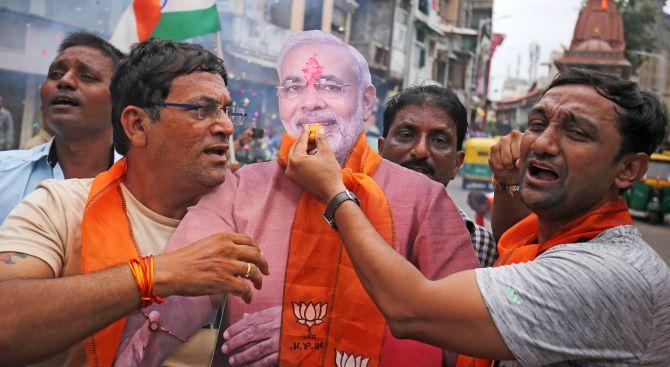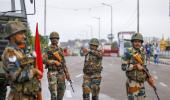‘Washington’s silence about India’s Article 370 move tells us all we need to know: It doesn’t want to rock the boat of a relationship that has navigated some choppy waters but remains a highly important one for the Trump administration.’

Michael Kugelman, Deputy Director, Asia Programme, and South Asia Senior Associate at the Woodrow Wilson Centre in Washington, DC, is a leading specialist on India, Pakistan, Afghanistan and their relationship with the United States.
The co-editor of 11 books, Kugelman tells Rediff.com’s Archana Masih in a detailed e-mail interview that India’s move is bold, unprecedented and controversial, so one might expect Washington’s reaction to be less subdued than it typically is after a major development involving Kashmir.
Part 1 of an informative interview:
In your view, how will revoking Article 370 alter Kashmir -- and New Delhi's relationship with Kashmir?
There’s no doubt about it, the revocation of Article 370 is a game-changer for the ages.
The impact on Kashmir at this point is unclear. For sure, the Indian government hopes that formally integrating Kashmir into India as a Union territory will stimulate development and investment and bring many state benefits to the region that were less accessible when it had its special status.
But for me, the question relates to stability.
In the Kashmir Valley, there will be anger about the decision, and one has to fear the possibility of new surges of violence -- not to mention Pakistan trying to exploit the situation by encouraging its militant proxies to enter the region and attack Indian security forces.
To be sure, some may argue that more investment, development, and state benefits will undercut anti-state sentiment and squelch separatist impulses. But for many Kashmiri Muslims in the Kashmir Valley, it’s not poverty that aggrieves them, it’s the presence of the Indian State itself.
So New Delhi will have a challenging job as it seeks to transition Kashmir into its new Union territory status: How to ensure that the intended benefits of revoking Article 370 are not imperiled, if not eclipsed by violence and unrest.
In an ideal world, the way forward would entail a less heavy-handed Indian security presence in Kashmir. But so long as there is unrest or the mere threat of it, that presence will remain in place, and understandably so.
How does this new twist in the tale affect India-Pakistan-US current relationship?
I think we’re looking at a status quo situation here.
India-Pakistan relations will remain strained, and on a diplomatic level they will likely take another plunge.
Islamabad will try to mount an international campaign meant to condemn India for its move.
I doubt this campaign will get very far, but it certainly won’t sit well in New Delhi.
Meanwhile, the US-India relationship will be largely unaffected; Washington’s silence about India’s Article 370 move tells us all we need to know: It doesn’t want to rock the boat of a relationship that has navigated some choppy waters but remains a highly important one for the Trump administration.
And US-Pakistan relations will be unaffected; the main focus will remain on Afghanistan.
When Alice Wells, a top US State Department official focused on South Asia, was in Islamabad earlier this week, one can imagine that the Pakistanis complained about India’s move, but I doubt that anything came of it; such a complaint likely elicited little response from Washington.
How will this resonate in Washington?
There was a lot going on in Washington when India made its Article 370 announcement.
Above all, it was grappling with a recent string of mass shootings. So while those US government officials and analysts that oversee South Asia were surely seized of the matter, I doubt you had a major scramble within the broader government to focus on it.
And at the end of the day, despite Trump’s offhand remarks about mediation, the US government policy on Kashmir has not changed.
It views it as an internal matter, or at most a bilateral matter between India and Pakistan, and it isn’t about to try to get involved -- unless or until there’s a crisis or conflict that breaks out between the two countries.
And at that point, Washington would want to intervene, but as a crisis manager to help lower tensions -- and not as a mediator on Kashmir.
If there’s been any recent evolution in this longstanding policy, it’s America’s willingness to sit back and let India engage in acts of self-defence (recall the Balakot strike) before it makes efforts to intervene.
When it comes to the US approach to Kashmir, nothing has changed.
To be sure, India’s move represents something bold and unprecedented and controversial, so one might expect Washington’s reaction to be less subdued than it typically is after a major development involving Kashmir.
There may be some strategic phone calls placed to senior officials in both India and Pakistan that urge restraint and calm in the aftermath of India’s decision. But I doubt the US reaction will go much further than that.
President Trump offered to mediate on Kashmir for the second time -- what do you think is the impetus for such an offer?
I don’t think we should overstate the significance of the second offer, or the first one for that matter.
The first offer, when Trump and Khan were having an exchange with the press, did not come out of thin air.
Rather, it came only after a journalist asked a question about Kashmir, and then Khan in his response all but goaded Trump into making the offer.
And Trump, who is often given to flattery and says what his interlocutors like to hear, was happy to oblige.
Not surprisingly, the State Department walked back his offer soon after he made it.
The second offer was a major climbdown from the first one.
Instead of saying (bizarrely and likely inaccurately) that Prime Minister Modi had expressed his interest in Trump’s mediation, this time Trump said he would mediate if asked by Modi.
And again, this comment was prompted by a journalist’s question. Trump didn’t make the proclamation on his own.
So in neither case do I sense an impetus for Trump to make the offer; rather, I think he was being purely reactionary and responding to questions.
Is the offer linked to America’s anxiousness for Pakistan’s help in getting the Taliban on board for a quick Afghan settlement and a withdrawal of American troops before the 2020 Presidential election?
Indeed, if there’s any impetus at play on Trump’s part, it’s simply to say something that Pakistan would want to hear in order to generate more goodwill and enhance prospects for US-Pakistan cooperation on the Afghan peace process.
Similarly, there’s good reason to believe that some of official Washington’s warm and friendly treatment of Khan was by design: An effort to build more goodwill and cultivate more trust with Pakistan to help make it easier for the bilateral relationship, one still fraught with mistrust, to focus its attention on Afghanistan.
The bottom line is we should not mistake Trump’s offhand remarks for any type of policy shift.
On the contrary, it’s just that -- offhand remarks, which may well have been part of a broader charm offensive. Nothing more, nothing less.
Do you think it is conceivable that Modi or any Indian prime minister would ever ask the US to mediate on Kashmir given India’s historical sensitivity on the matter?
I can’t imagine this happening, and especially not during the Modi era.
The current Indian government has taken a consistently strident position on Kashmir that brooks zero appetite for considerations about third-party intervention.
Additionally, New Delhi’s decision to repeal Article 370 and bring Jammu and Kashmir into India proper sends a very powerful message to the international community: Now that Kashmir has formally been integrated into India, there is no dispute and therefore no need for mediation.
Why do you think President Trump even made such an outrageous comment given the fact that it would anger India and lead the Indian government to virtually call an American president a liar, clearly a first in Indo-US relations?
Well, given some of the rocky times for the US-India relationship during the Cold War era, I’m sure that epithets far worse than “liar” have been leveled by each side in previous decades.
At any rate, we shouldn’t overstate the significance of Trump’s mediation offers.
In both cases, he was simply responding to questions from journalists.
In the first case, Imran Khan all but goaded him into making the offer. And in the second case, he said something that is ultimately quite pedestrian: He would be happy to mediate if asked by Modi.
And given that Modi won’t ask, we know that Trump’s offer is immaterial.
Yes, the optics of Trump’s comments were dreadful for US-India relations (though splendid for US-Pakistan relations!), and they required some awkward climbdowns and clarifications from the US side.
But these were just offhand remarks, made impulsively, as is often the case with Trump’s proclamations. They do not represent a new policy.
Part II: 'Washington is not going to fall for Pakistan's trap'










